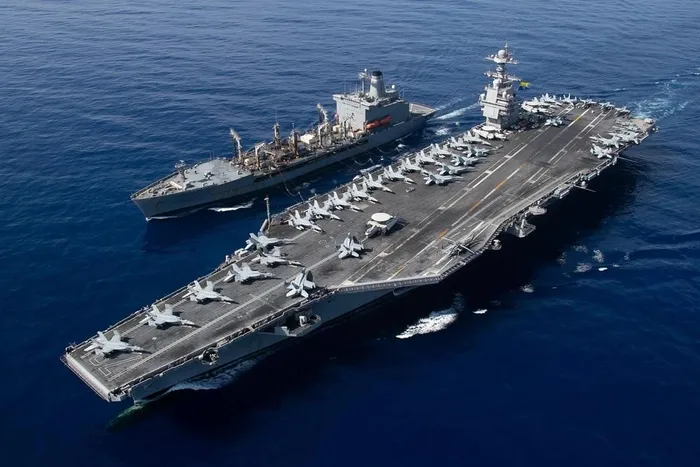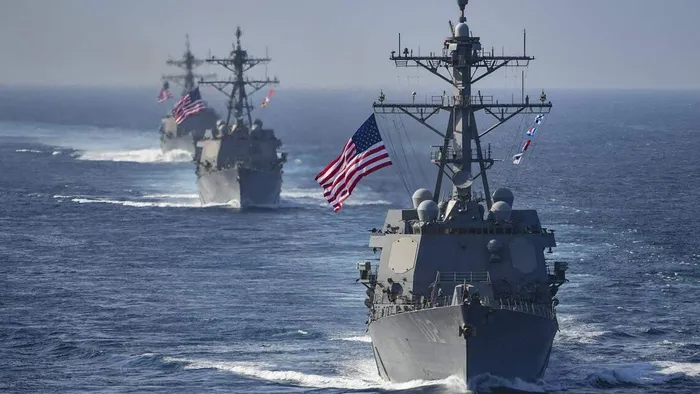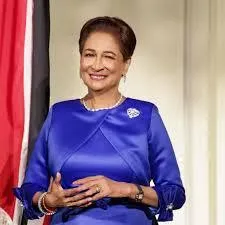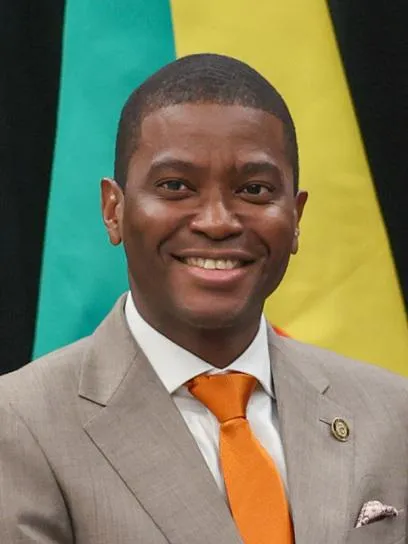It's not just Venezuela, as US boat strikes spread fear across the Caribbean

The USS Gerald R Ford, the largest aircraft carrier ever constructed is seen here refueling in the Mediterranean. It is currently in the South Caribbean off the coast of Venezuela.
Image: US Navy
Amanda Coletta
In Trinidad and Tobago, a Caribbean island nation so close to Venezuela that on a clear day it’s visible, the second homes off the northwestern coast lie empty. Fishers are staying close to the shore, and some have stopped working at night.
As US forces launch lethal attacks on boats the Trump administration alleges are carrying illegal drugs to the United States, and the Pentagon masses fighter jets, warships and troops off the coast of Venezuela, the waters on which Trinidadians have long relied for their food, livelihoods, and leisure no longer feel safe.
Jarrod, a fisherman in the northwestern peninsula of Chaguaramas, said bookings for the croaker, King mackerel and mahi-mahi fishing charters he operates have been down since the strikes began in early September. He spoke on the condition his last name be withheld for fear of retaliation.
“The general populace is a bit hesitant to go knowing that boats are being struck down,” he said. “They’re apprehensive.”
The U.S. attacks are sending waves across the Caribbean, exposing divisions between leaders on narcotrafficking and raising alarms in a region where a long history of U.S. interventionism casts a shadow - even as officials acknowledge there’s little they can do to stop them.
“We are facing … an extremely dangerous and untenable situation in the southern Caribbean,” Barbados Prime Minister Mia Mottley said Saturday. “Peace is critical to all that we do in this region, and now, that peace is being threatened.”
The U.S. military has blown up more than a dozen boats in the Caribbean Sea and the eastern Pacific since early September, killing at least 61 people. Administration officials have alleged, without producing evidence, that the boats are crewed by “narcoterrorists” who are “poisoning” Americans with lethal drugs such as fentanyl.

US President Donald Trump has ordered the Arleigh Burke-class guided-missile destroyers to the southern Caribbean, off the coast of Venezuela.
Image: US Navy
Legal analysts say the strikes violate U.S. law and international law.
At least half of the attacks have occurred in the waters between Venezuela and Trinidad, a route used to traffic cannabis and cocaine to West Africa and Europe - not, as President Donald Trump has claimed, fentanyl to the United States.
During the first Trump administration, a federal grand jury indicted Venezuelan President Nicolás Maduro on charges of narcoterrorism. Trump has accused the authoritarian socialist of heading a narcotrafficking gang that’s attacking the United States with illicit drugs.
Washington has long sought Maduro’s ouster. Now the largest U.S. military buildup in the region in several decades is raising fears in Venezuela of an imminent attack. Maduro has moved troops to the border with Colombia, urged civilians to join “self-defense militias” and, in a rare televised appeal in English, urged “please, please, please … no crazy war … peace forever!”
The Caribbean Community, or CARICOM, issued a statement this month reaffirming that the region is a “zone of peace” and should remain free from military intervention.
CARICOM heads of government, the bloc said, remained committed to fighting drugs and weapons trafficking. But they “underscored their efforts to overcome these challenges should be through ongoing international cooperation and international law” and “reaffirmed unequivocal support for the sovereignty and territorial integrity of countries in the Region.”
Trinidad and Tobago, alone among CARICOM’s 15 full members, “reserved its position” on the statement.

The US posturing places Trinabagonian Prime Minister Kamla Persad-Bissessar, an ardent Trump supporter, in an awkward position.
Image: Supplied
Trinabagonian Prime Minister Kamla Persad-Bissessar has been a strident backer of the U.S. strikes. The nation of 1.4 million suffers one of the highest murder rates in the world. The government last year declared a state of emergency, granting itself sweeping new powers, including the authority to enter homes without warrants and arrest people on suspicion of illegal activity.
“The pain and suffering the cartels have inflicted on our nation is immense,” Persad-Bissessar said after the first strike. “I have no sympathy for traffickers; the U.S. military should kill them all violently.”
Trinidad does not manufacture firearms. Most are trafficked from the United States, the U.N. Office on Drugs and Crime reported last year, where they are often purchased through straw buyers in U.S. states with lax gun laws. Some are also trafficked from Venezuela.
Persad-Bissessar has called CARICOM an “unreliable partner.” She has accused those who have warned that a war between Venezuela and the United States could threaten Trinidad of “fearmongering.”
When two Trinidadian men were reportedly killed in a U.S. strike, officials said they had no evidence they had been killed and wouldn’t search for them. They encouraged their families to file missing people reports.
The government’s posture has drawn criticism at home.
“The strikes are disturbing because they’re obviously extrajudicial strikes that are not supported by any legal framework whatsoever,” former attorney general Garvin Nicholas said. "It should not be that the government encourages extrajudicial killings.”
The guided missile destroyer USS Graveley docked in Port-of-Spain, the capital, this week for joint exercises.
Maduro suspended an energy agreement with Trinidad - the nation, he charged, was acting as the “aircraft carrier of the U.S. empire” - and Venezuela’s National Assembly declared Persad-Bissessar persona non grata.
The prime minister wondered aloud why she would want to visit Venezuela.
“No one, whether it is the Venezuelan government, CARICOM or any other entity - no one will pressure my government or blackmail my government into retreating from the fight against drug cartels,” she told the television program Crime Watch.
“It is very clear that some of our CARICOM partners have taken a different view by talking about a zone of peace,” she said. “But there is no zone of peace in Trinidad and Tobago. … We have witnessed too many murders, too much crime and too much drug running.”
Other Caribbean leaders say they want to curb drug and arms trafficking, too, but they question the legality and efficacy of the U.S. campaign. Many rely heavily on security cooperation with the United States.
Officials worry privately about the impact of the attacks on their fishing, shipping and tourism industries, one Caribbean diplomat said, the backbone of the economies of many small island states. Like others in this report, he spoke on the condition of anonymity to discuss the sensitive matter.
“Everybody would like to see the back of narcotraffickers, but is this the best way to do it?” he asked. “And is the best way doing it unilaterally and not in consultation with the people in the Caribbean Sea? Those are the questions the Caribbean is asking. But at the end of the day, the Caribbean is powerless to do much about this and that is the reality.”
Bahamian National Security Minister Wayne R. Munroe urged nationals to stay clear of go-fast boats in Venezuela. If the U.S. chooses “to sail in your harbor, there’s nothing you could do,” he told reporters this month. “It would be a breach of your sovereignty, and you could complain, but you couldn’t stop them.”
In Haiti, a government official said even commenting on the U.S. strikes “would be madness.”
“There are things Haiti simply cannot interfere in,” the official said. “It’s the big neighbor taking action. Let it act.”
The Trump administration has retaliated against its critics. Colombian President Gustavo Petro has called the strikes “murder” - and also ineffective: People smuggling drugs on boats, he said, are young and poor and don’t own the product. He told The Post last month the attacks were “only for television.”
The administration this month imposed sanctions on Petro and his family. Trump called him an “illegal drug trader.” He has not produced evidence.
The government of Grenada, 100 miles north of Trinidad, is considering a U.S. request to host a military radar installation and people to run it.

Prime Minister of Grenada Dickon Mitchell has been put under US pressure over a military radar installation.
Image: File
US Marines invaded the small island in October 1983 after the assassination of then-Prime Minister Maurice Bishop, ostensibly to protect some 600 American medical students at St. George’s University.
It was the height of the Cold War, and then-President Ronald Reagan had watched with dismay as Bishop, a socialist revolutionary, built an international airport with the help of armed Cuban workers.
The Grenadian government said the facility was intended to foster tourism, but Reagan told a radio audience it “looked suspiciously suitable for military aircraft, including Soviet-built long-range bombers.”
That airport, now named for the slain leader, would be the site of the U.S. radar installation. Prime Minister Dickon Mitchell this month acknowledged the complexity of responding to the request.
“I appreciate that because of the history of the Maurice Bishop International Airport, because October in particular is tied to the history … that it is a highly emotive issue,” he said on his radio call in program, “DMs with the PM.”
U.S. Southern Command did not respond to a request for comment.
Saint Vincent and the Grenadines Prime Minister Ralph Gonsalves, a Maduro ally, has criticized the U.S. campaign and Trinidad and Tobago’s support. He believes the U.S. intends to use the radar to pressure the Venezuelan leader. But he has acknowledged that Grenada is in a tough spot. A preponderance of the island’s tourists and the students enrolled at St. George’s University, its largest private employer, are American.
“There are all kinds of pressures which could be brought,” Gonsalves told reporters this month. “On the other side, there are principles of nonintervention noninterference.”
In Trinidad, fishers have contended with pirates. They’ve struggled with high fuel costs. And now, amid U.S. military strikes, they fear being collateral damage.
“Everybody’s terrified,” said Gary Aboud, corporate secretary of the nonprofit Fisherman and Friends of the Sea in Port-of-Spain. “There’s no law and order on the sea.”
The Trump administration has done little to assuage their worries.
“Hell, I wouldn’t go fishing right now in that area of the world,” Vice President JD Vance said he told Defense Secretary Pete Hegseth.
Jarrod said fishers are wary of venturing too close to the maritime border with Venezuela “not only for the fear of the U.S. military but also for fear of the Venezuelan military.”
Aboud called the strikes “uncalled-for and unforgivable.”
“What are we playing this game for?” he said. “As if joining with the United States is going to solve the problems of Trinidad and Tobago.”
Anderson Zoe, a fisherman in the northwestern village of Toco, said “fishers are really very much concerned.”
“There is no press-pause button or reconciliation if you are targeted and you are suspected and you are blown out of this world.”